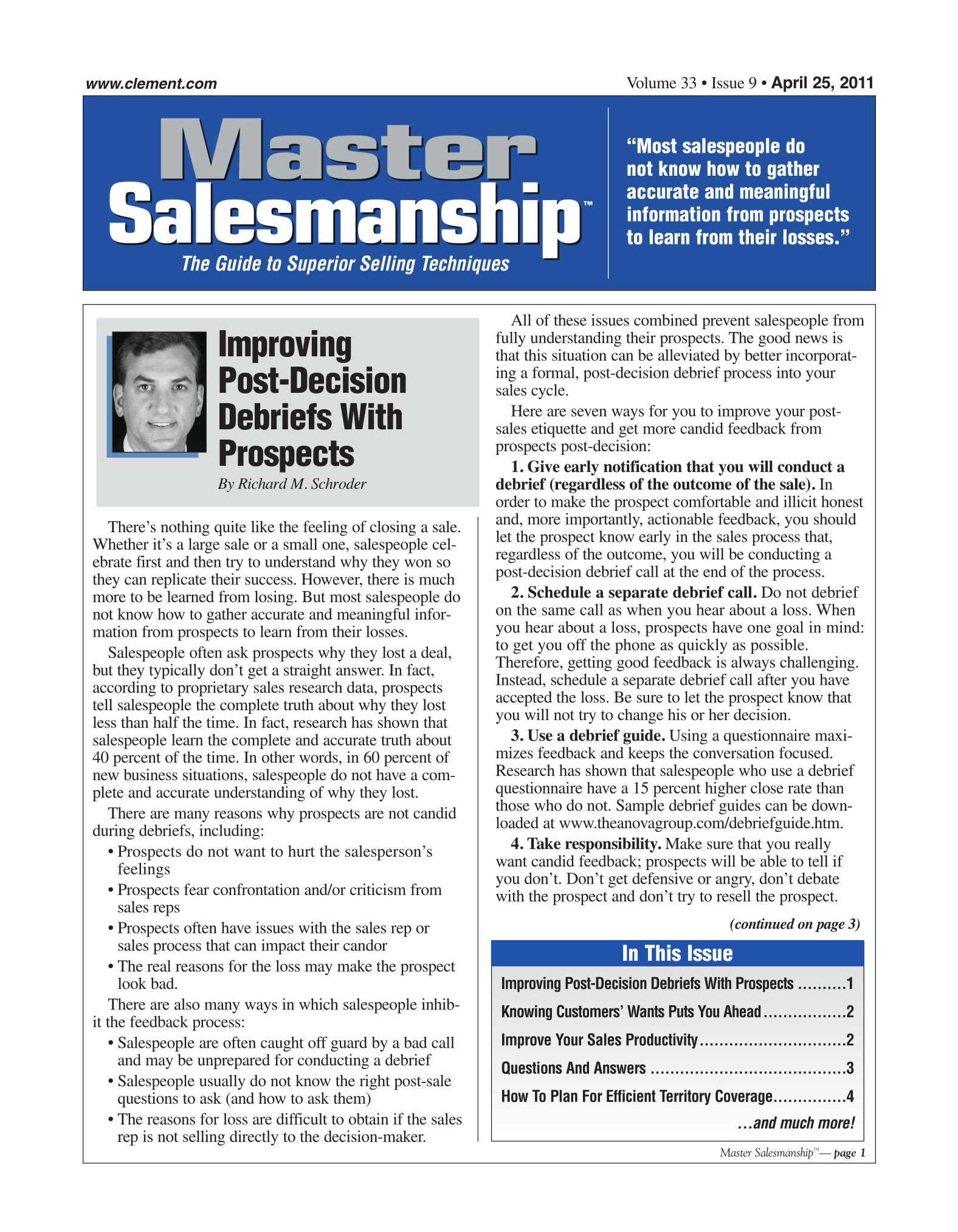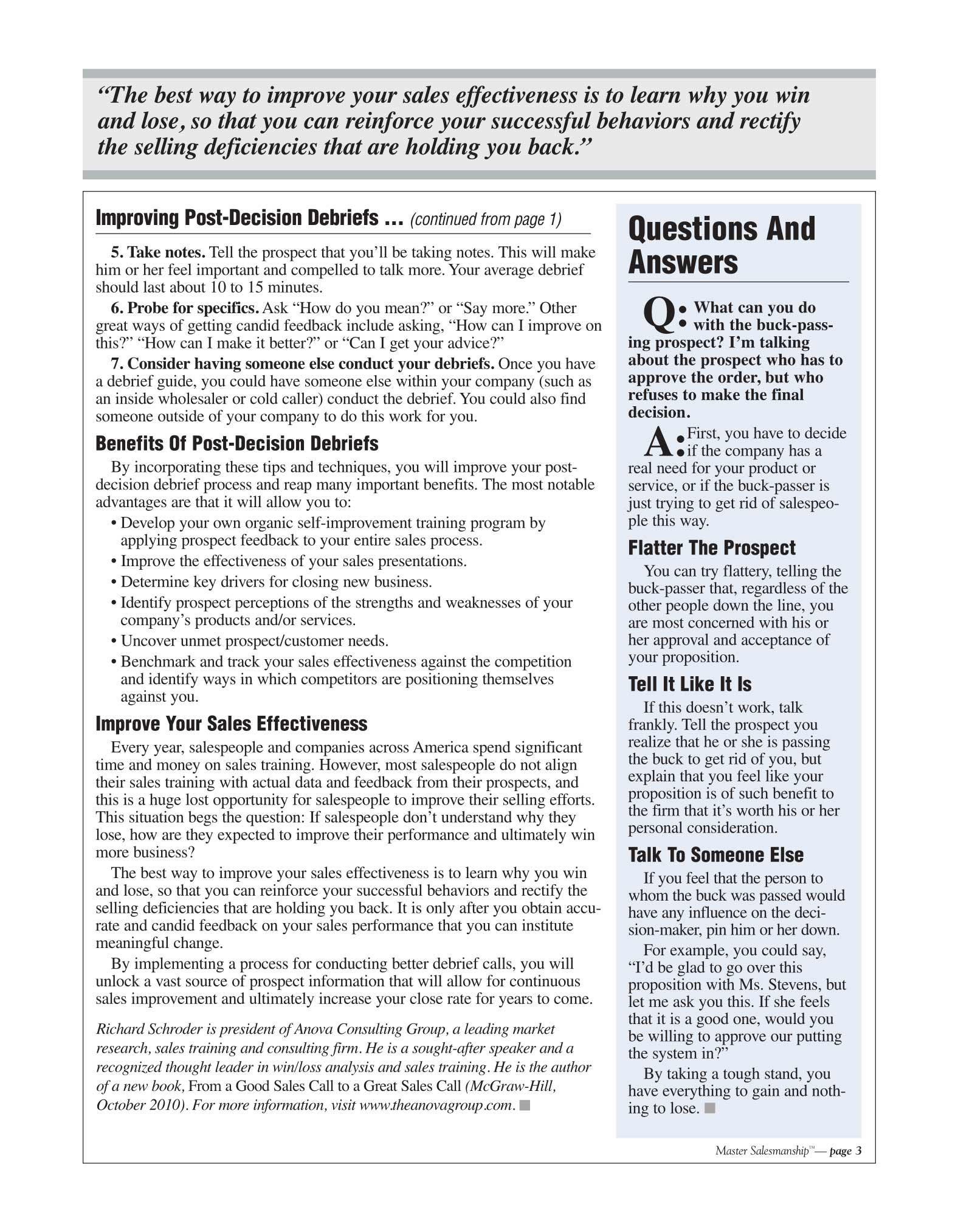



There’s nothing quite like the feeling of closing a sale. Whether it’s a large sale or a small one, sales people celebrate first and then try to understand why they won so they can replicate their success. However, there is much more to be learned from losing. But most salespeople do not know how to gather accurate and meaningful information from prospects to learn from their losses.
Salespeople often ask prospects why they lost a deal, but they typically don’t get a straight answer. In fact, according to proprietary sales research data, prospects tell salespeople the complete truth about why they lost less than half the time. In fact, research has shown that salespeople learn the complete and accurate truth about 40 percent of the time. In other words, in 60 percent of new business situations, salespeople do not have a complete and accurate understanding of why they lost.
There are many reasons why prospects are not candid during debriefs, including:
• Prospects do not want to hurt the salesperson’s feelings
• Prospects fear confrontation and/or criticism from sales reps
• Prospects often have issues with the sales rep or sales process that can impact their candor
• The real reasons for the loss may make the prospect look bad.
There are also many ways in which salespeople inhibit the feedback process:
• Salespeople are often caught off guard by a bad call and may be unprepared for conducting a debrief
• Salespeople usually do not know the right post-sale questions to ask (and how to ask them)
• The reasons for loss are difficult to obtain if the sales rep is not selling directly to the decision-maker.
All of these issues combined prevent salespeople from fully understanding their prospects. The good news is that this situation can be alleviated by better incorporating a formal, post-decision debrief process into your sales cycle.
Here are seven ways for you to improve your post- sales etiquette and get more candid feedback from prospects post-decision:
1. Give early notification that you will conduct a Win / Loss debrief (regardless of the outcome of the sale). In order to make the prospect comfortable and illicit honest and, more importantly, actionable feedback, you should let the prospect know early in the sales process that, regardless of the outcome, you will be conducting a post-decision debrief call at the end of the process.
2. Schedule a separate Win / Loss debrief call. Do not debrief on the same call as when you hear about a loss. When you hear about a loss, prospects have one goal in mind: to get you off the phone as quickly as possible. Therefore, getting good feedback is always challenging. Instead, schedule a separate debrief call after you have accepted the loss. Be sure to let the prospect know that you will not try to change his or her decision.
3. Use a Win / Loss debrief guide. Using a Win / Loss analysis questionnaire maximizes feedback and keeps the conversation focused. Research has shown that salespeople who use a debrief questionnaire have a 15 percent higher close rate than those who do not. Sample debrief guides can be downloaded at Anova Consulting Debrief Guide.
4. Take responsibility. Make sure that you really want candid feedback; prospects will be able to tell if you don’t. Don’t get defensive or angry, don’t debate with the prospect and don’t try to resell the prospect.
5. Take notes. Tell the prospect that you’ll be taking notes. This will make him or her feel important and compelled to talk more. Your average debrief should last about 10 to 15 minutes.
6. Probe for specifics. Ask “How do you mean?” or “Say more.” Other great ways of getting candid feedback include asking, “How can I improve on this?” “How can I make it better?” or “Can I get your advice?”
7. Consider having someone else conduct your Win / Loss debriefs. Once you have a debrief guide, you could have someone else within your company (such as an inside wholesaler or cold caller) conduct the debrief. You could also find someone outside of your company to do this work for you.
Benefits Of Win Loss Debriefs
By incorporating these tips and techniques, you will improve your post- decision debrief process and reap many important benefits. The most notable advantages are that it will allow you to:
• Develop your own organic self-improvement training program by applying prospect feedback to your entire sales process.
• Improve the effectiveness of your sales presentations.
• Determine key drivers for closing new business.
• Identify prospect perceptions of the strengths and weaknesses of your company’s products and/or services.
• Uncover unmet prospect/customer needs.
• Benchmark and track your sales effectiveness against the competition and identify ways in which competitors are positioning themselves against you.
Improve Your Sales Effectiveness
Every year, salespeople and companies across America spend significant time and money on sales training. However, most salespeople do not align their sales training with actual Win / Loss data and feedback from their prospects, and this is a huge lost opportunity for salespeople to improve their selling efforts. This situation begs the question: If salespeople don’t understand why they lose, how are they expected to improve their performance and ultimately win more business?
The best way to improve your sales effectiveness is to learn why you win and lose, so that you can reinforce your successful behaviors and rectify the selling deficiencies that are holding you back. It is only after you obtain accurate and candid feedback on your sales performance that you can institute meaningful change.
By implementing a process for conducting better Win / Loss debrief calls, you will unlock a vast source of prospect information that will allow for continuous sales improvement and ultimately increase your close rate for years to come.